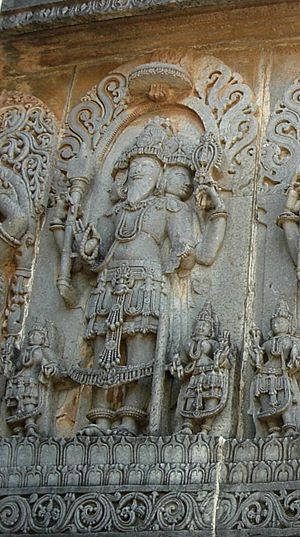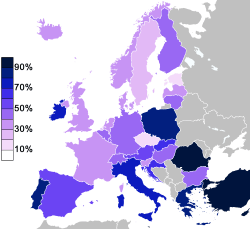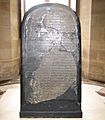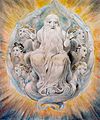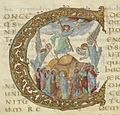God facts for kids
Many religions and mythologies teach that God is the creator of the Earth and everything in it. People who believe in God are called theists. They think God created everything that exists. In most religions, God is believed to be immortal (cannot die) and to have unlimited power.
The belief that God or gods exist is called theism. People who do not believe that God or any gods exist are called atheists. Agnostics think we cannot know for sure if God or gods exist. They might or might not believe in a deity. People who believe in God but not in traditional religions are called deists.
Some religions have many gods. This is called polytheism. Examples include Hinduism, Shinto, Taoism, and Wicca. The belief that there is only one God is called monotheism. People who believe in one God usually write "God" with a capital "G". Some monotheistic religions are Christianity, Judaism, Islam, Bahá'í Faith, and Sikhism. When talking about many gods, the word "gods" is usually written with a small "g".
Contents
Does God Really Exist?
Many people have wondered if God exists. Thinkers and religious leaders have tried to prove or disprove it. Science usually does not deal with whether supernatural things exist.
There are many ideas about God's existence. Some people say God does not exist (strong atheism). Others say God almost certainly does not exist (de facto atheism). Some believe no one knows if God exists (agnosticism). Others believe God exists, but this cannot be proven (deism or theism). And some believe God exists and this can be proven (strong theism).
Names for God
God has different names in different religions. Here are some examples:
- Yahweh or Elohim in Judaism and Christianity.
- Allah in Islam.
- Baha in Bahá'í Faith.
- Ahura Mazda in Zoroastrianism.
Believing in God Around the World
By the year 2000, over half of the world's people belonged to one of the three main Abrahamic religions. These are Christianity (33%), Islam (20%), and Judaism (less than 1%). Other religions include Buddhism (6%), Hinduism (13%), and traditional Chinese religion (6%). Most of these religions involve God or gods. Some religions do not have a god concept.
God in Abrahamic Religions
Abrahamic religions are very popular monotheistic religions. They include Judaism, Christianity, and Islam. In these religions, people believe there is only one God.
In Judaism, the name of God is often not said aloud. Some Jews today use names like YHWH (Yahweh) or Jehovah. Muslims use the word Allah, which is the Arabic word for "God."
Followers of Abrahamic religions (except for some Islamic believers) believe that God created human beings in his image. This idea is not always easy for people to understand. One artistic idea shows God as a wise old man, which became popular during the Renaissance.
God in Christianity
The Christian Holy Bible talks about God in different ways. The Old Testament mentions "God the Father." The New Testament is about Jesus, or "God the Son." Many Christians believe Jesus was God living on Earth. Christians also believe the Holy Spirit is God, the third part of God.
In the New Testament, God is seen in three forms: the Father, the Son, and the Holy Spirit. This is called the Holy Trinity. The word "Trinity" is not in the Bible. But the word used for God in the first chapter of Genesis is actually plural. Also, the phrase "in the name of the Father, Son and Holy Spirit" is used in the New Testament, for example in Matthew 28:19.
Christians believe that God came to Earth as a human, born as a man named Jesus. Jesus came to give everyone a chance for salvation from their own evil, called sin. Christians believe that human evil affects one's relationship with God. This problem cannot be fixed by self-improvement. It needs God to step in. When Jesus prayed, he called God "Father" and taught others to do the same.
Jesus also taught that people must be "born again" to receive God's Spirit. Otherwise, they stay separated from God. After a person accepts the free gift of eternal life that Jesus offers, God comes to live in that person.
God in Eastern Religions
In Hinduism, there is one God called Brahman. But Brahman is said to have taken many different forms, or incarnations. Some of these are Rama, Krishna, Buddha, Shiva, Kali, Parvati, and Durga. To people outside Hinduism, this might look like worshipping many gods. But it is really worshipping one God in different ways.
Some Hindus also believe that God's spirit lives in everyone. This idea is called Advaita Vedanta, which is a Hindu term for Monism.
Religions like Buddhism and Confucianism sometimes involve worshipping many gods, or sometimes no gods at all.
In Shinto, there is no single specific God like in most religions. Instead, there are many deities called kami. Kami are the spirit and essence of all nature things, both living and non-living. This includes rocks, trees, and even poetry. Shinto is a polytheistic religion. It is often believed that there are eight-million Kami (八百万の神 yaoyorozu-no-kami). In Japanese language, "eight-million" often means infinity.
God in Western Philosophy
Philosophers talk about God or god. Sometimes they mean a specific god. Other times, they are just talking about the general idea of god.
One of the first Western philosophers to write about God in a monotheistic way was the Greek Aristotle. He described God as the Supreme Cause. Aristotle saw God as a being that makes everything happen, but is not changed by anything else.
The idea of an "all-powerful" God brings up interesting questions. One is called the God paradox. It asks if God can make a mountain (or rock) so heavy that he cannot lift it. This question looks at whether an "all-powerful" god could do two things that go against each other.
Many people have tried to prove God's existence using logic. Blaise Pascal said it is better to believe in God than not to. This idea is known as Pascal's wager. Pascal was a mathematician. He used this argument to explain expected value in statistics. Other arguments include the ontological argument, the cosmological argument, and the teleological argument. In the 1970s, Kurt Gödel created an argument for God's existence using modal logic.
Related pages
Images for kids
-
God Blessing the Seventh Day, 1805 watercolor painting by William Blake.
-
Isaac Newton believed a Creator was needed for astronomical objects to move. Painting by Godfrey Kneller, 1689.
-
Praying Hands by Albrecht Dürer.
-
Ahura Mazda (on the right, with high crown) gives Ardashir I (left) the ring of kingship. (Relief at Naqsh-e Rustam, 3rd century CE).
-
The symbolic Hand of God in the Ascension from the Drogo Sacramentary, around 850 CE.
-
The Arabic script of "Allah" in the Hagia Sophia, Istanbul.
See also
 In Spanish: Dios para niños
In Spanish: Dios para niños
 | Jackie Robinson |
 | Jack Johnson |
 | Althea Gibson |
 | Arthur Ashe |
 | Muhammad Ali |


